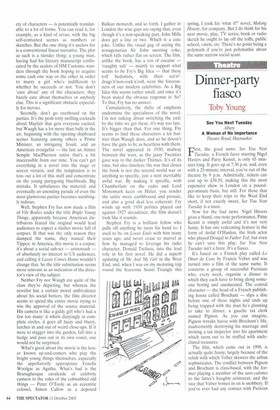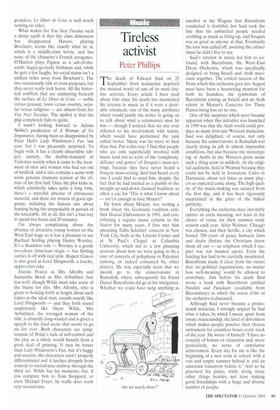Dinner-party fiasco
Toby Young
See You Next Tuesday Albery A Woman of No Importance Theatre Royal Haymarket First, the good news. See You Next Tuesday, a French farce starring Nigel Havers and Patsy Kensit, is only 65 minutes long. It goes up at 7.30 p.m. and, even with a 25-minute interval, you're out of the theatre by 9 p.m. Admittedly, tickets can cost up to £38.50, making this the most expensive show in London on a poundper-minute basis, but still. For those that like to keep their trips to the West End short, if not exactly sweet, See You Next Tuesday is a must.
Now for the bad news. Nigel Havers gives a bland, one-note performance, Patsy Kensit is simply awful and it's not very funny. It has one redeeming feature in the form of Ardal O'Hanlon, the Irish actor who played Dougal in Father Ted, but even he can't save this play. See You Next Tuesday isn't a farce. It's a fiasco.
It's based on a French play called Le Diner de Cons by Francis Veber and was turned into a film of the same name. It concerns a group of successful Parisians who, every week, organise a dinner in which they each have to bring along someone boring and uneducated. The central character — the head of a French publishing house called Brochant — slips a disc before one of these nights and ends up being trapped with the man he's planning to take to dinner, a gauche tax clerk named Pignon. As you can imagine, Pignon wreaks havoc with Brochant's life, inadvertently destroying his marriage and inviting a tax inspector into his apartment which turns out to be stuffed with undeclared treasures.
The film, which came out in 1998, is actually quite funny, largely because of the relish with which Veber skewers the urban sophisticates. The conflict between Pignon and Brochant is class-based, with the former playing a member of the sans-culottes to the latter's haughty aristocrat, and the vice that Veber homes in on is snobbery. If you've ever had any contact with Parisian grandees, Le Diner de Cons is well worth renting on video.
What makes See You Next Tuesday such a damp squib is that this class dimension has disappeared. Havers, playing Brochant, seems like exactly what he is, which is a middle-class luwie, and has none of the character's French arrogance. O'Hanlon plays Pignon as a salt-of-theearth, happy-go-lucky Irishman and, while he gets a few laughs, his social status isn't a million miles away from Brochanes, The two occasionally talk at cross-purposes, but they never really lock horns. All the historical conflicts that are simmering beneath the surface of Le Diner de Cons — noble versus peasant, town versus country, secular versus religious — are absent from See You Next Tuesday. The upshot is that the play completely fails to ignite.
I wasn't looking forward to Adrian Noble's production of A Woman of No Importance, having been so disappointed by Peter Hall's Lady Windemere's Fan last year, but I was pleasantly surprised. To begin with, it has a clearly discernible subject, namely, the double-standard of Victorian society when it came to the treatment of men and women who had sex out of wedlock, and it also contains a scene with some genuine dramatic tension at the climax of the first half. Once the plot kicks in, which admittedly takes quite a long time, there's a merciful absence of extraneous material, and there are dozens of good epigrams, including the famous one about hunting being the unspeakable in pursuit of the uneatable. All in all, this isn't a bad way to spend two hours and 20 minutes.
I'm always complaining about the absence of attractive young women on the West End stage so it was a pleasure to see Rachael Stirling playing Hester Worsley, It's a thankless role — Worsley is a goody two-shoes American virgin — but Stirling carries it off with real style. Rupert Graves is also good as Lord Illingworth, a louche, upper-class rake.
Joanne Pearce as Mrs Allonby and Samantha Bond as Mrs Arbuthnot fare less well, though Wilde must take some of the blame for this. Mrs Alionby, who is given to holding forth at length about such topics as the ideal man, sounds exactly like Lord Illingworth — and they both sound suspiciously like Oscar Wilde. Mrs Arbuthnot, the wronged woman of the title, is absurdly long-winded and is given a speech in the final scene that seems to go on for ever. Both characters are symptomatic of Wilde's lack of self-control and the play as a whole would benefit from a great deal of pruning. It may be better than Lady Windemere's Fan, but it's baggy and uneven, the characters aren't properly differentiated and it lurches abruptly from comedy to melodrama midway through the third act. Wilde has his moments, but, if you compare him to Tom Stoppard, or even Michael Frayn, he really does seem very second-rate.



















































































 Previous page
Previous page